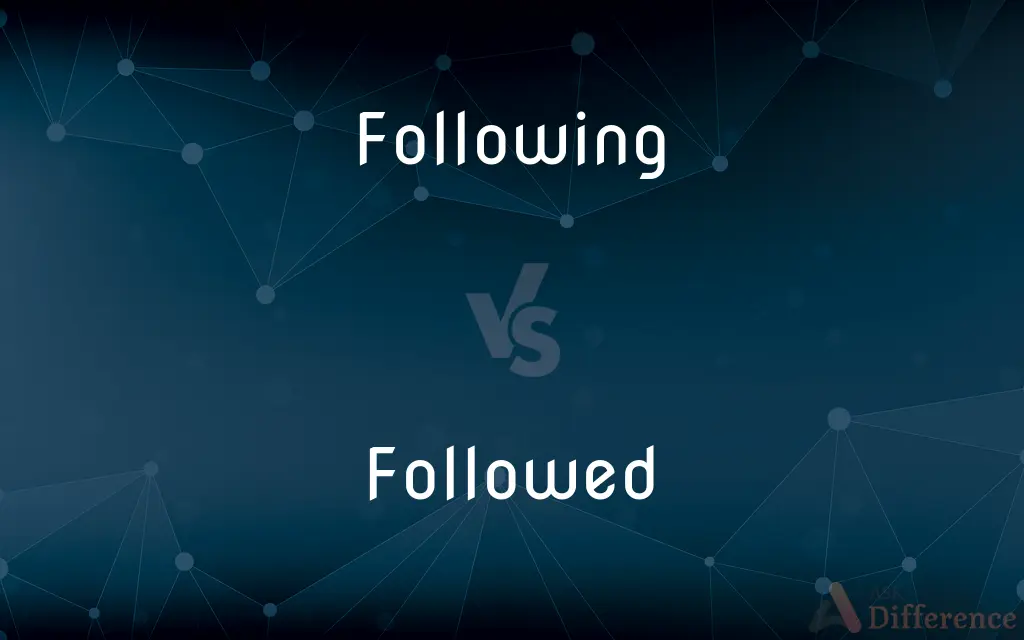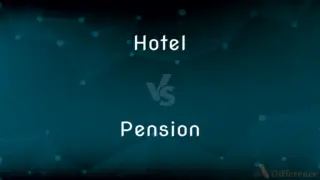Following vs. Followed — What's the Difference?
By Maham Liaqat & Urooj Arif — Updated on April 20, 2024
"Following" often describes the act of pursuit or subscribing to someone, while "followed" is the past tense, indicating completed action of following.

Difference Between Following and Followed
Table of Contents
ADVERTISEMENT
Key Differences
"Following" can be used as a gerund or present participle, indicating an ongoing action, like pursuing someone on social media. Whereas, "followed" is the simple past tense of "follow," used to describe an action that has already been completed, such as when someone has been trailed and then left alone.
In grammar, "following" is versatile, acting as an adjective, noun, or part of a continuous verb phrase. On the other hand, "followed" is strictly a verb, specifically in the past form, limiting its grammatical roles.
When used in technology and social media, "following" refers to currently subscribing to updates from someone. Conversely, "followed" could be used in recounting past actions, like describing someone who once had followers but perhaps not anymore.
"Following" can also introduce a noun or clause, as in instructions or sequences. Whereas "followed" cannot function in this capacity, it solely recounts what came after another event.
The term "following" is dynamic, suggesting a sense of action or immediacy in various contexts, such as following instructions. On the other hand, "followed" often conveys a more passive or historical narrative, as in actions completed in the past.
ADVERTISEMENT
Comparison Chart
Part of Speech
Gerund, present participle, noun
Past tense verb
Usage in Sentences
Describes ongoing or future actions
Describes completed actions
Contextual Usage
Social media, sequences, instructions
Recounting past events, stories
Flexibility in Grammar
Can act as adjective, verb, or noun
Limited to verb form
Temporal Aspect
Implies current or continuous action
Implies action has already occurred
Compare with Definitions
Following
Coming after or as a result.
Following the meeting, we will announce the decision.
Followed
Completed the action of following.
He followed the crowd into the theater.
Following
Engaging in the act of following.
She was following the map when she got lost.
Followed
Was followed in a specific action.
The rules were followed meticulously.
Following
A group of supporters or enthusiasts.
The band's following grew after their latest album release.
Followed
Indicating sequence in past actions.
The speech was followed by applause.
Following
Next, afterward.
We will discuss the budget following.
Followed
Used in perfect tenses.
They had followed the same routine for years.
Following
Coming after in order.
The following items are on sale.
Followed
Referenced a past event.
Followed by a reception, the ceremony was beautiful.
Following
Following is a 1998 independent neo-noir crime thriller film written and directed by Christopher Nolan. It tells the story of a young man who follows strangers around the streets of London and is drawn into a criminal underworld when he fails to keep his distance.
Followed
To come or go after; proceed behind
Follow the usher to your seat.
Following
Coming next in time or order
In the following chapter.
Followed
To go after in pursuit
Would follow his enemy to the ends of the earth.
Following
Now to be enumerated
The following people will report for duty.
Followed
To keep under surveillance
The agent followed the suspect around town.
Following
Blowing in the same direction as the course of a ship or aircraft. Used of wind.
Followed
To move along the course of; take
We followed the path.
Following
A group or gathering of admirers, adherents, or disciples
A lecturer with a large following.
Followed
To move in the direction of; be guided by
Followed the sun westward.
Followed the signs to the zoo.
Following
The item or items to be mentioned next
Please buy the following.
Followed
To lie in the same path as
The road follows the old trading route.
Following
Subsequent to; after
Following dinner, brandy was served in the study.
Followed
To be parallel to
The road follows the river.
Following
Coming next, either in sequence or in time.
See the following section.
Followed
To accept the guidance, command, or leadership of
Follow a spiritual master.
Rebels who refused to follow their leader.
Following
About to be specified.
The following words have no definition...
Followed
To adhere to; practice
Followed family traditions.
Following
(of a wind) Blowing in the direction of travel.
The following wind sped us on our way.
Followed
To take as a model or precedent; imitate
Followed my example and resigned.
Following
After, subsequent to.
Following the meeting, we all had a chat.
Followed
To act in agreement or compliance with; obey
Follow the rules.
Follow one's instincts.
Following
A group of followers, attendants or admirers; an entourage.
He had a loyal following.
Followed
To keep to or stick to
Followed the recipe.
Follow a diet.
Following
Vocation; business; profession.
Followed
To engage in (a trade or occupation); work at.
Following
(with definite article, treated as singular or plural) A thing or things to be mentioned immediately after.
The following is a recommendation letter from the president.
The following are the three most important questions.
Followed
To come after in order, time, or position
Night follows day.
Following
Present participle of follow
Followed
To bring something about at a later time than or as a consequence of
She followed her lecture with a question-and-answer period. The band followed its hit album with a tour.
Following
One's followers, adherents, or dependents, collectively.
Followed
To occur or be evident as a consequence of
Your conclusion does not follow your premise.
Following
Vocation; business; profession.
Followed
To watch or observe closely
Followed the bird through binoculars.
Following
Next after; succeeding; ensuing; as, the assembly was held on the following day.
Followed
To be attentive to; pay close heed to
Too sleepy to follow the sermon.
Following
In the field of a telescope) In the direction from which stars are apparently moving (in consequence of the earth's rotation); as, a small star, north following or south following. In the direction toward which stars appear to move is called preceding.
Followed
To keep oneself informed of the course, progress, or fortunes of
Follow the stock market.
Followed the local teams.
Following
A group of followers or enthusiasts
Followed
To grasp the meaning or logic of; understand
Do you follow my argument?.
Following
The act of pursuing in an effort to overtake or capture;
The culprit started to run and the cop took off in pursuit
Followed
To come, move, or take place after another person or thing in order or time.
Following
Going or proceeding or coming after in the same direction;
The crowd of following cars made the occasion seem like a parade
Tried to outrun the following footsteps
Followed
To occur or be evident as a consequence; result
If you ignore your diet, trouble will follow.
Following
In the desired direction;
A following wind
Followed
To grasp the meaning or reasoning of something; understand.
Following
Immediately following in time or order;
The following day
Next in line
The next president
The next item on the list
Followed
(Games) A billiards shot in which the cue ball is struck above center so that it follows the path of the object ball after impact.
Following
About to be mentioned or specified;
The following items
Followed
Simple past tense and past participle of follow
Common Curiosities
Is "followed" appropriate in academic writing?
Yes, "followed" is appropriate in academic writing when discussing methodologies or historical events in the past tense.
Can "following" be used in legal documents, and if so, how?
Yes, "following" is commonly used in legal documents to specify items or conditions that come after a particular statement, often introducing lists or requirements.
What is the implication of using "following" in instructions?
Using "following" in instructions implies that the steps or guidelines listed are to be executed immediately or in the sequence presented.
How do the roles of "following" and "followed" differ in narrative writing?
In narrative writing, "following" often sets the stage for a subsequent action, while "followed" recounts actions that have already taken place, anchoring the narrative in past events.
Can "following" indicate temporal sequences in event planning?
Yes, "following" is often used in event planning to denote activities or segments that occur one after another, helping to organize the flow of events.
In what contexts is "followed" used to discuss technology or software?
"Followed" is used in technology or software to describe steps that were completed in the development process or in historical updates and changes.
How does the usage of "followed" change in passive versus active voice?
In active voice, "followed" directly states that the subject performed the following action; in passive voice, it shifts focus to the action being received by the subject, e.g., "The instructions were followed."
How does the usage of "following" differ in formal versus informal contexts?
In formal contexts, "following" is often more structured and specific, often introducing formal lists or legal terms, whereas in informal contexts, it may simply indicate what comes next in a conversation or narrative.
Is there a preferred context for using "followed" in historical accounts?
"Followed" is preferred in historical accounts when detailing events that have completed, providing a chronological order or conclusion to historical narratives.
What impact does tense have on the interpretation of "following" and "followed" in storytelling?
Tense impacts interpretation by placing "following" in a present or future context, suggesting ongoing or imminent action, while "followed" sets actions firmly in the past, giving a sense of completion.
What are some synonyms for "following" when used as a preposition?
Synonyms for "following" when used as a preposition include "after," "subsequent to," and "succeeding."
Can "followed" indicate causality in scientific writing?
Yes, "followed" can indicate causality in scientific writing by detailing sequences of events or results that occurred as a direct result of previous actions, experiments, or studies.
Does "following" have a specific usage in sports commentary?
In sports commentary, "following" is used to indicate actions or events that are expected to occur next, often building anticipation or setting the context for what viewers should pay attention to.
How does the flexibility of "following" enhance its usage in everyday language compared to "followed"?
The flexibility of "following" as a noun, adjective, or verb allows it to fit various contexts in everyday language, making it more dynamic and versatile than the more temporally and grammatically restricted "followed."
Can "followed" be used metaphorically, and if so, in what context?
Yes, "followed" can be used metaphorically to describe a logical sequence or outcome in arguments or discussions, as in "As night follows day, so too did their defeat follow their mistakes."
Share Your Discovery

Previous Comparison
Carbohydrate vs. Polysaccharide
Next Comparison
Hotel vs. PensionAuthor Spotlight
Written by
Maham LiaqatCo-written by
Urooj ArifUrooj is a skilled content writer at Ask Difference, known for her exceptional ability to simplify complex topics into engaging and informative content. With a passion for research and a flair for clear, concise writing, she consistently delivers articles that resonate with our diverse audience.













































